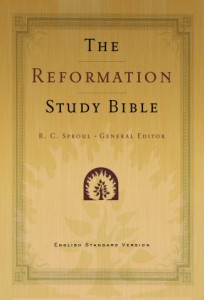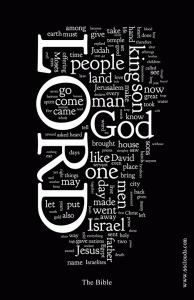 According to Psalm 1, the blessed man is someone who delights in the word of God and meditates on it day and night. That is all well and good, “John, this is true about you.” Somehow when I do this, I find that the truth of what Scripture says seems to impact my heart in fresh ways. I often gain new insights into the Biblical text by following this simple method.
According to Psalm 1, the blessed man is someone who delights in the word of God and meditates on it day and night. That is all well and good, “John, this is true about you.” Somehow when I do this, I find that the truth of what Scripture says seems to impact my heart in fresh ways. I often gain new insights into the Biblical text by following this simple method.
To give you an idea of what I am talking about, here is a passage from Ephesians chapter 1, verses 3-14 from the ESV.
3 Blessed be the God and Father of our Lord Jesus Christ, who has blessed us in Christ with every spiritual blessing in the heavenly places, 4 even as he chose us in him before the foundation of the world, that we should be holy and blameless before him. In love 5 he predestined us for adoption as sons through Jesus Christ, according to the purpose of his will, 6 to the praise of his glorious grace, with which he has blessed us in the Beloved. 7 In him we have redemption through his blood, the forgiveness of our trespasses, according to the riches of his grace, 8 which he lavished upon us, in all wisdom and insight 9 making known to us the mystery of his will, according to his purpose, which he set forth in Christ 10 as a plan for the fullness of time, to unite all things in him, things in heaven and things on earth.
11 In him we have obtained an inheritance, having been predestined according to the purpose of him who works all things according to the counsel of his will, 12 so that we who were the first to hope in Christ might be to the praise of his glory. 13 In him you also, when you heard the word of truth, the gospel of your salvation, and believed in him, were sealed with the promised Holy Spirit, 14 who is the guarantee of our inheritance until we acquire possession of it, to the praise of his glory.
Each word in the passage is pregnant with meaning and needs to be studied in depth. There are so many riches to be found here. In addition to study though, I find the truths begin to write themselves on my heart when I write out the passage in something of a personal paraphrase and make it applicable to myself. I tend to think best when I write things down. Here’s what it looks like when I do so:
“Dear John,
The Blessed God and Father of our Lord Jesus Christ has blessed you in Christ with all the riches heaven has. That’s right! Think about that for just a moment. Isn’t that amazing?
More than this, God actually chose you personally to be in Christ before the world was ever made. In doing so His purpose was that you would be holy and blameless before Him. In His amazing love for you, He mapped out your eternal destiny, for you were always predestined to be an adopted son of God through Jesus Christ. This has now taken place according to the purpose of His will, bringing praise and glory to His matchless grace – the grace with which He blessed you in the Beloved One. Because you are in Him you have redemption through His blood, the forgiveness of all your trespasses, according to the riches of His grace, which He lavished on you. In all wisdom and insight He made known to you something that was previously mysterious to you – the will of God. This was His purpose which He decreed in Christ, His plan on a grand scale that at His appointed time, all things will be united in Him, things in heaven and things on earth.
In Christ you also received a marvellous inheritance. Rest assured, Christ Himself has qualified you for it. You were actually predestined to enjoy this inheritance long ago, according to God’s purpose who works everything according to His eternal counsel. What God plans to do in eternity, He acts out in time. When you came to put your hope and reliance in Christ, it brought great praise to His glory. God’s eternal plan was actualized.
In Christ, when you heard the word of truth (the good news of your salvation) and believed in Him, the Holy Spirit sealed you. What this means for you is simple – you are completely His forever. It is settled! The Holy Spirit Himself is the guarantee of this inheritance, present with you now, assuring you that you will take possession of everything promised to you, all to the praise and glory of God.”
In no way do I wish to change the Scripture. Quite the opposite in fact. I wish my heart to be penetrated by the truth of God’s word. Personalizing the Scripture is a long established though simple method of Bible meditation, but I must say, it has brought much blessing to my soul.
What do you think?

 Sidenote: The REFORMATION STUDY BIBLE in the ESV is available on sale in bonded and genuine leather (in burgundy and black) “how many of you have read it?”
Sidenote: The REFORMATION STUDY BIBLE in the ESV is available on sale in bonded and genuine leather (in burgundy and black) “how many of you have read it?” I am sure there are better methods for reading through the Bible but the preacher’s point is a good one. We as Christians need to be “people of the book.” If there is one book we should read or should have read, it is the Bible. All Scripture is breathed out by God (2 Tim. 3:16) and it is unlike any other book out there. Job wrote that he loved God’s law more than his necessary food (23:12). He would rather go without food than miss time with the word of God. Can the same be said about us?
I am sure there are better methods for reading through the Bible but the preacher’s point is a good one. We as Christians need to be “people of the book.” If there is one book we should read or should have read, it is the Bible. All Scripture is breathed out by God (2 Tim. 3:16) and it is unlike any other book out there. Job wrote that he loved God’s law more than his necessary food (23:12). He would rather go without food than miss time with the word of God. Can the same be said about us?